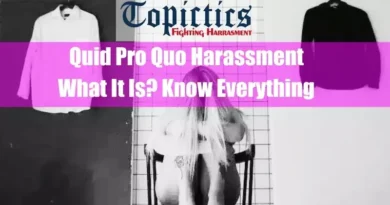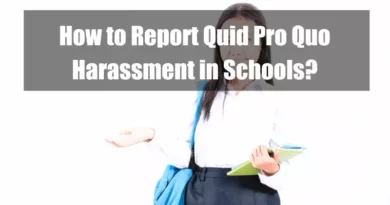What is Explicit Quid Pro Quo Harassment?
Takeaways
| Key Points |
|---|
| Explicit quid pro quo harassment occurs when a person in a position of authority explicitly demands sexual favors or personal benefits in exchange for job-related perks or to avoid negative consequences, with no ambiguity in the request. |
| This contrasts with implicit quid pro quo harassment, where coercion is suggested rather than directly stated, making it harder to prove due to its subtle nature. |
| Explicit harassment is often easier to identify, as it involves clear propositions like “Sleep with me, and you’ll get the promotion,” whereas implicit harassment may involve indirect statements or expectations without a direct demand. |
| Legally, a quid pro quo harassment claim requires proving that the victim was subjected to unwelcome conduct, that the harassment was tied to job conditions, and that the harasser had authority, leading to tangible harm such as termination or lost opportunities. |
| Courts typically require concrete evidence, including witness testimony or documentation, to establish that the harassment was a substantial factor in causing harm to the victim’s employment status. |
Definition of Explicit Quid Pro Quo Harassment
Explicit quid pro quo harassment occurs when a person in a position of power, such as a manager or supervisor, directly demands sexual favors or other personal benefits in exchange for job-related perks or the avoidance of negative consequences.
The term “explicit” highlights that the exchange is clearly stated or communicated without ambiguity. This form of harassment involves a straightforward proposition: “Do this, and you will receive that,” often regarding employment-related benefits like promotions, raises, or continued job security.
For instance, a supervisor telling an employee, “If you go on a date with me, I’ll make sure you get the promotion,” is a direct form of explicit quid pro quo harassment. This type of behavior clearly outlines the exchange and leaves little room for misinterpretation.

How Explicit Quid Pro Quo Harassment Differs from Implicit Quid Pro Quo Harassment
Explicit and implicit quid pro quo harassment share the same fundamental abuse of power, but they differ mainly in how the harassment is communicated:
- Explicit Quid Pro Quo Harassment:
- Direct and Clear: The demand is clearly stated, and there is no doubt about the nature of the request.
- Examples: Statements like, “Sleep with me, and I’ll make sure you keep your job,” or “If you don’t comply, you’ll be fired” are explicit demands tied directly to job outcomes.
- Impact: Explicit harassment is often easier to identify and document because the demands are overt and straightforward, leaving less room for ambiguity. However, even in explicit cases, proving the harassment in legal proceedings can still depend on the availability of concrete evidence, such as witnesses or written documentation.
- Implicit Quid Pro Quo Harassment:
- Indirect and Subtle: The harassment is implied rather than directly stated. The person in power may hint at the consequences or benefits without directly making a demand.
- Examples: A supervisor might make suggestive comments like, “It would be great if you could spend more time with me after hours,” or create situations where compliance seems expected for continued employment or advancement.
- Impact: Implicit harassment can be more challenging to prove because it relies on interpreting the harasser’s intentions and the context of their actions. The coercive element may be subtle, creating ambiguity about whether a clear demand was made.
The key difference is that explicit quid pro quo harassment leaves no ambiguity about the proposition being made. In contrast, implicit harassment operates through suggestions, hints, or veiled threats.
Legal Requirements and Claims

To legally establish quid pro quo harassment, a victim (the plaintiff) must prove certain elements:
- Employment Relationship: The victim must be an employee or a job applicant within the organization where the harassment occurred.
- Unwelcome Conduct: The harassment must involve unwelcome sexual advances or conduct.
- Condition of Employment: The sexual advances are linked to job benefits, decisions, or conditions.
- Position of Authority: The harasser must be in a supervisory or authoritative role.
- Harm to the Victim: The victim must suffer harm due to the harassment, such as losing a job opportunity or being subjected to unfavorable job conditions.
- Substantial Factor: The harassment must be a substantial factor in causing harm to the victim.
Courts generally require evidence of significant employment actions resulting from the harassment, such as being fired, denied a promotion, or facing other adverse employment decisions due to the refusal of sexual advances.
Legal Implications of Explicit Quid Pro Quo Harassment
Explicit quid pro quo harassment is illegal under employment laws in many jurisdictions, including the U.S., where it violates Title VII of the Civil Rights Act. Legal claims of explicit harassment are often stronger because the evidence of coercion is usually more apparent. Courts look for clear indications that the victim was subjected to an explicit demand that linked job benefits or detriments to compliance with the harasser’s wishes.
Employers are held strictly liable for explicit quid pro quo harassment perpetrated by supervisors or managers because these individuals represent the company. To defend against such claims, employers must demonstrate that they took reasonable steps to prevent and correct any harassment and that the employee unreasonably failed to take advantage of preventive or corrective opportunities provided by the employer.
Impacts on Victims

Victims of explicit quid pro quo harassment often face severe emotional, psychological, and professional consequences. The pressure to comply with explicit demands can cause stress, anxiety, and a sense of powerlessness. Many victims feel trapped, fearing retaliation or job loss if they refuse or report the harassment. This stress can manifest in decreased job satisfaction, lower productivity, and even health issues like depression.
In addition to personal impacts, victims may also face professional setbacks. Those who refuse to comply might be demoted, denied promotions, or even fired. Conversely, those who comply may feel compromised, ashamed, and uncomfortable at work, affecting their overall job performance and career progression.
Preventing Explicit Quid Pro Quo Harassment

Employers are responsible for creating a work environment free from all forms of harassment, including explicit quid pro quo. Key steps include:
- Clear Anti-Harassment Policies: Employers should implement clear, detailed policies that define quid pro quo harassment, outline unacceptable behaviors, and specify consequences for violators.
- Training Programs: Regular training helps employees and supervisors understand what constitutes harassment, how to prevent it, and the proper steps for reporting it.
- Reporting Mechanisms: Employers should provide safe, confidential, and accessible channels for employees to report harassment without fear of retaliation.
- Prompt and Thorough Investigations: All complaints should be investigated quickly and impartially, with appropriate actions taken to address and correct any harassment found.
- Support for Victims: Providing access to counseling and other support services can help victims cope with the emotional impacts of harassment.
What Victims Should Do

If you experience explicit quid pro quo harassment, take the following steps:
- Document Everything: Keep detailed notes of incidents, including what was said, when, and where. Save any emails, texts, or other communications that show the harassment.
- Report the Incident: Use your company’s reporting procedures, whether it’s through HR, a designated harassment officer, or another official channel.
- Seek Legal Advice: Consult an employment attorney to understand your rights and explore legal options, including filing a complaint with the Equal Employment Opportunity Commission (EEOC).
- Emotional Support: Reach out to trusted friends, family, or mental health professionals for support during this difficult time.
Conclusion
- Explicit quid pro quo harassment is a clear abuse of power in the workplace, involving explicit demands for personal or sexual favors in exchange for job benefits or to avoid negative consequences. This form of harassment is often more explicit and direct, though proving it can still require substantial evidence and documentation.
- While quid pro quo harassment is distinct from other forms of workplace harassment, such as creating a hostile work environment, both are damaging and can have serious legal and emotional repercussions. Understanding these forms of harassment is essential for fostering safer workplaces and ensuring victims receive the justice and support they need.
- By establishing strong anti-harassment policies, providing regular training, and promoting a culture of respect, employers can actively prevent such harmful behaviors and protect the rights of all employees.
FAQ
What constitutes “Explicit Sexual Harassment”?
Explicit sexual harassment involves clear and unmistakable actions or comments of a sexual nature that are unwelcome. This can include direct propositions for sexual activities, overt sexual comments, or unambiguous physical gestures. Such behaviors are clearly inappropriate and violate workplace policies and laws.
How is “Unwelcome Conduct” defined in the context of explicit sexual harassment?
“Unwelcome conduct” refers to behavior that is not solicited or invited by the recipient and is regarded as undesirable or offensive. In cases of explicit sexual harassment, the actions or comments are unsolicited and unwanted by the victim. The perception of the conduct as unwelcome is a critical factor in establishing harassment.
What is a “Hostile Work Environment” in relation to explicit sexual harassment?
A “hostile work environment” occurs when unwelcome sexual conduct unreasonably interferes with an individual’s work performance or creates an intimidating, hostile, or offensive work environment. Explicit sexual harassment can contribute to such an environment, affecting the victim’s ability to perform their job effectively.
Who is considered a “Perpetrator” in explicit sexual harassment cases?
A “perpetrator” is an individual who commits acts of sexual harassment. In explicit sexual harassment cases, the perpetrator engages in overt actions or comments of a sexual nature that are unwelcome and inappropriate. Perpetrators can be supervisors, coworkers, or even non-employees such as clients or customers.
What is the role of a “Confidential Resource” in addressing explicit sexual harassment?
A “confidential resource” is an individual or office designated to provide support to victims of sexual harassment without the obligation to report the incident to authorities or the institution. They offer a safe space for victims to discuss their experiences and explore options for reporting and support.
How does “Retaliation” relate to explicit sexual harassment?
“Retaliation” involves adverse actions taken against an individual for reporting sexual harassment or participating in an investigation. It is illegal and can include actions such as demotion, termination, or other negative employment decisions. Retaliation is prohibited under employment discrimination laws, and employees are protected from such actions when they report or oppose discriminatory practices.
What is the “Equal Employment Opportunity Commission (EEOC)” and its role in addressing explicit sexual harassment?
The Equal Employment Opportunity Commission (EEOC) is a federal agency responsible for enforcing laws against workplace discrimination, including sexual harassment. The EEOC defines sexual harassment as unwelcome sexual advances, requests for sexual favors, and other verbal or physical harassment of a sexual nature. Individuals who believe they have experienced such harassment can file a complaint with the EEOC, which will investigate the claim and may take action against the employer if violations are found.
What is “Vicarious Liability” in the context of explicit sexual harassment?
“Vicarious liability” is a legal principle where an employer can be held responsible for the actions of its employees if those actions occur within the scope of employment. In explicit sexual harassment cases, if an employee engages in harassment that leads to a tangible employment action, the employer may be held vicariously liable, regardless of whether the employer was aware of the conduct. This underscores the importance of employers implementing effective anti-harassment policies and training programs.
How does “Power Dynamic” influence explicit sexual harassment?
“Power dynamic” refers to the balance of power between individuals in a workplace. In explicit sexual harassment cases, a power imbalance can exist when a person in a position of authority engages in overt sexual behaviors toward a subordinate, making it difficult for the victim to refuse or report the conduct due to fear of retaliation or negative consequences.
What are “Preventive Measures” in addressing explicit sexual harassment?
“Preventive measures” are proactive steps employers take to prevent harassment in the workplace. These include establishing clear anti-harassment policies, training employees and supervisors regularly, creating effective reporting mechanisms, and promptly investigating complaints. Implementing such measures not only helps prevent incidents of explicit sexual harassment but also demonstrates the employer’s commitment to maintaining a safe and respectful work environment. Additionally, having robust preventive measures can be a critical factor in an employer’s defense against harassment claims.









